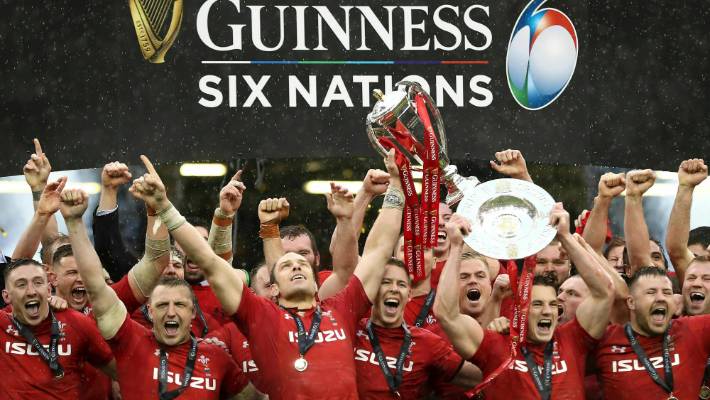
Wales beat Ireland 25-7 to win Six Nations and grand slam
Warren Gatland Wales’s head coach marked his final campaign in the Six Nations, with the men in red at least, in the manner of his first by beating all the rest. Ireland did not consider him to be good enough when they sacked him in 2001 but his record since then has been one of unrivalled success.
No coach in the championship’s history, whether between five nations or six, had masterminded three grand slams and this victory reflected the mental and physical resolve he has brought to a side previously known for its flakiness and tendency to implode after success. In terms of individual players, this is far from Wales’s best ever team but there has never been one as strong collectively.
Gatland said in the buildup that matches between teams of near-equal strength were usually decided by which one wanted it that little bit more. From the kick-off, which Alun Wyn Jones opted for after winning the toss, Wales had the appetite of junkyard dogs that had not been fed for a week. They ripped into everything and their 16-0 interval lead was down not just to taking most of their chances but causing Ireland’s set pieces to malfunction.
The half-time score was 16-0 on the opening night of the Six Nations in Paris. Wales were trailing then but staged one of the greatest comebacks in the tournament’s history. Their campaign was notable for their ability to both come from behind and to defend a lead, something Ireland and England were unable to do when it mattered.
Wales carried the ball for only 100 metres, minimising the risk of handling errors in the wet, and targeted their opponents at the strongest point. There is no more dangerous side in an opponents’ 22 than Ireland. After 23 minutes, when they trailed 10-0, they were awarded a penalty, which they kicked to touch and drove a lineout. The manoeuvre has been bountiful for them in the Joe Schmidt era and Wales set up to defend the maul rather than contest the throw.
Ireland rumbled forwards, the second-row Adam Beard using his long reach to get his hands on the ball. Ireland tried to release his grip and conceded a scrum, but Justin Tipuric leant a hand and held on. A few minutes later, Ireland had a scrum in Wales’s 22. They were awarded a free-kick which CJ Stander took too quickly, tapping the ball into the back of a team-mate.
They were two key moments in the half and they summed up a match in which the champions were given no time to think. Wales defended as a team to frustrate opponents who pride themselves on not being ruffled and Ireland got nothing from their set pieces. They have not been the most adventurous side nor the most technically equipped, but no one has played with such assurance in those around them; not even the early loss of George North with a wrist injury jolted their momentum and prompted a major reshuffle behind.
North had set them up for the perfect start, chasing Gareth Anscombe’s kick-off and bouncing Jacob Stockdale into touch. Wales took play through a few phases after the lineout and, after drawing Stander offside, milked the advantage, Anscombe chipping deftly into space for Hadleigh Parkes to exploit a rush defence and score.
The match was 70 seconds old and the crowd, which brought the Welsh national anthem to a rousing conclusion, in full voice. Ireland looked for a response, but having opted to keep the roof open, the rain made handling hazardous. Wales used their scrum-half Gareth Davies to tackle low around the fringes and defuse Ireland’s ploy of using runners off their scrum-half.
Ireland’s first opportunity came after five minutes when Josh Adams, chasing a long kick, tripped Keith Earls. The referee, Angus Gardner, ruled the offence was inadvertent and confined his sanction to a penalty, which Johnny Sexton took quickly. He kicked the ball across field for Stockdale who, with Wales caught out, set off with the line 45 metres away. He went around Gareth Davies and seemed destined to make it until Parkes, displaying the desire Gatland had referenced, caught the wing and forced a knock-on.
It was typical of a side that gave nothing up, forcing its own destiny. Ireland were thrown off course, bungling two lineouts and penalised at three scrums. Without their staples, they were victims of Wales’s hustling and kicking into space. Risk was minimised and Wales’s points after the early try came through six Anscombe penalties as Ireland gave away soft offences under pressure.
Ireland’s attempt to play catch-up was not helped by the steady rain but such was Wales’s resolve the roof was a minor issue. Just after North left the field, Wales’s captain, Alun Wyn Jones, cried out in pain after twisting his knee in a ruck. He was treated for three minutes and the noise in the stadium abated but there was no way the warrior was leaving the field of battle, adrenaline numbing the pain as he continued to lead the charge, carrying the ball further than any of his fellows and making 16 tackles out of 16.
There was no second-half response from Ireland. Two penalties from Anscombe in the third quarter put Wales more than three converted tries ahead. The crown had been ripped from the champions’ head, exposing a bald patch. Jordan Larmour broke Ireland’s duck with the final move of the match, no consolation as Wales leapfrogged them to second in the world rankings. Cue the celebrations and emotion: even the hard-nosed Gatland shed tears as his players held aloft the trophy.
Now onto the RWC in October 2019

Be the first to comment